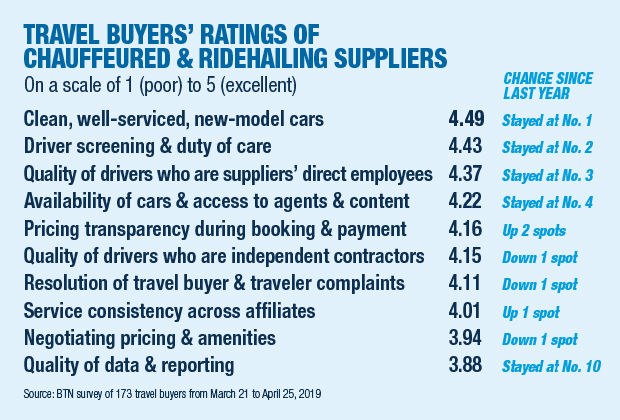
Travel buyers report that service levels from their chauffeured and ridehailing suppliers improved year over year. Scores rose across every car-ride category in BTN's Ground Transportation Survey. The survey encompasses both kinds of suppliers, though under one-fifth of respondents have enrolled in ridehailing suppliers' corporate travel programs, such as Uber for Business.
The order of categories as ranked by buyer satisfaction went largely unchanged this year from last year's survey. Suppliers once again scored best on the quality of their vehicles, driver screening and duty of care and the quality of drivers who are direct employees. The bottom three categories once again were quality of data and reporting, service consistency across affiliates and negotiating pricing and amenities. Many travel buyers said their providers needed to improve in the consistency category. "Affiliates need to be held to the same standards globally," one buyer wrote of chauffeured services. "A car should never be late for a pickup."
Nearly three-quarters of travel buyers said service levels have been consistent compared with the previous year. Additionally, nearly 20 percent said service had gotten better, while only 6.4 percent said it had gotten worse.
The line between traditional chauffeured suppliers and ridehailing apps continues to blur as both try to improve on what the other does better, Blacklane CEO and co-founder Jens Wohltorf said. New "technology platforms brought in a lot of technical innovation in how you hail and book a car and invoicing—the end-to-end technical journey. And on the physical experience, the legacy industry has been good in delivery of the final ride," he said. "The industry has been woken up by the disruptors, and they are trying to leverage on their strength."
Chauffeured suppliers have continued to upgrade their technology; EmpireCLS, for example, announced in August the development of a new app with simplified booking capabilities, vehicle tracking and driver information, though the app is not meant to provide on-demand bookings. A few years ago, Carey International launched its Embarque 10&2 platform, which provides a ride within 10 minutes along with GPS tracking and driver and vehicle information. It now operates in Boston and San Francisco.
About three-quarters of travel buyers said they are at least aware of on- or near-demand services offered by traditional suppliers, though only about 18 percent said they use such services. Taxis are getting into the game, too, thanks to apps like Arro, which enables riders to book taxis in ridehailing style. And Xooox, which launched in the U.K. in recent weeks, searches for local cabs and lets drivers set their own prices.
The ridehailing apps, meanwhile, have firmly settled into corporate travel. Uber still leads as the most-expensed ridehailing brand for North American businesses in Certify's analysis of its expense reports. On Lyft's first earnings call, in May, president and co-founder John Zimmer said revenue from its corporate partners is growing faster than its overall business. Fewer than 20 percent of travel buyers in BTN's survey have enrolled their companies in one of the ridehailing suppliers' corporate business programs. About half of travel buyers allow the apps but do not address them in policy, and a quarter said they encourage their travelers to use them in certain circumstances. Only 6.1 percent prohibit use of the services in their travel policies.
Uber and Lyft, however, find themselves under tighter financial scrutiny now that both have gone through IPOs and are operating at heavy losses. Lyft CFO Brian Roberts on the company's earnings call said this will be a peak loss year as Lyft moves toward profitability. Both companies are investing in areas outside ridehailing, such as autonomous vehicles, bike-sharing and food delivery.
Methodology
From March 21 through April 25, 2019, BTN surveyed travel manager and travel buyer members of the BTN Research Council and a randomly selected subset of qualified subscribers of BTN and Travel Procurement. Equation Research hosted the survey and tabulated the results, and totals were based on 314 respondents. Buyers scored their preferred chauffeured and ridehailing providers on a five-point scale.